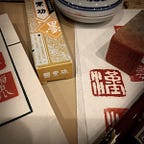The Six Degrees of “lol”
Japanese vs English
Like for all the other gamers out there, the PS5 announcement was super exciting, and I thoroughly enjoyed Sony’s presentation of the upcoming games and console design. The new graphics for some of the games were literally breathtaking, but for me, that wasn’t the only reason why I almost died of lung failure. I was watching the livestream through the Japanese channel, and the comments there were absolutely hilarious. Though many of the jokes are bound to get lost in translation, I thought instead it would be interesting to share a comparison of the various degrees of laughter in netizen speak of English vs. Japanese.
Although rudimentary, this is basically it:
- 笑 (wara)
The most faint “lol”. Used when something is amusing but nothing to gloat about. Perhaps it’s more of a formality, where you just put it there because you want to sound nice, but you didn’t actually laugh out loud. Equivalent to our “ha” or “haha”.
The character 笑 means to laugh of course, and the root word “laughter” is 笑い (warai). So basically this is as standard as you can get. - 笑笑 (warawara)
There are many instances in the Japanese language where you can repeat a sound or phrase to soften the blow, or sound more affectionate. It’s similar to raising your pitch or not in English. “Sure, ok!” with the accent on the “o” is more friendly than a monotone “Sure ok” which depending on the situation may put your EQ on alert. So by saying 笑笑 instead of 笑, you’re pretty much guaranteeing that something is genuinely funny to you. So I would think that “haha” or “hahaha” etc. is the closest translation here. - w
This is where things start to get more “online-ish” and we start to feel the presence of our Reddit-like brethren. Who wants to type out 笑 or 笑笑 each time you think something is funny? “笑” usually requires five keyboard strokes (wa+ra+i+backspace+enter) to type out, and if you’re typing a lot you want to settle for a short cut. So the Japanese have decided to keep it at two keystrokes (w + enter). Given how much it’s used and that it represents genuine laughter, “lol” is the equivalent here. - www
When something is particularly funny, just string a bunch of w’s together. Three is probably the most common multiple, but no one minds how many and it’s really up to you. Easily the equivalent to “lolllll”. - 草
Thanks to online gerrymandering this one gets associated a lot with the “otaku” of Japan but in reality plenty of people use this. At some point #4 gets old, and whether you have 15 or 20 w’s lined up starts to not matter to the naked eye. wwwwwwwwwwwwwwwwww. But then a different question arises — what does this list of w’s look like? The conclusion was grass, and that’s what 草 means.
There are other ways to use Lvl 5. A synonym for 草 is 芝 (shiba), which in spoken Japanese is used to describe grass in lawns, parks, or gardens. You can also say “I laughed” metaphorically by writing “grew grass” 草生えた (kusa haeta). I would recommend reserving this for things which literally made you laugh out loud though. - ワロス
You’ve officially entered Otaku territory and there’s no denying it. The word for the highest degree of laughter is the result of multiple evolutions from the simple comment “I laughed”. In Japanese that’s 笑った (waratta). This was first shortened to ワラタ “warata”, then became ワロタ “warota”, and was finally combined with some other popular phrases which all ended with the “s” sound to form ワロス. Naturally being Lvl 6 something would have had to made you literally laugh out loud, and rather hard to use this.
You can apply some extensions to this phrase too like for Lvl 5. ギガワロスand テラワロス. That’s Giga-warosu and Tera-warosu, as in gigabyte, terabyte… so something has to be just that funny or you have to be just that nerdy to use those.
As a conclusion, degrees 1 and 2 are universal, degrees 3 and 4 are commonly used by anyone from age 0–30ish, degree 5 is understood by anyone from age 0–30ish but not used too often, and degree 6 is more about how Reddit-ish one has been in his or her lifetime.
